#chani parallel
Text

DREAM vs. REALITY
#chani kynes#dune film#dune part one#dune part two#dream vs reality#chani parallel#paulchani#paul x chani#chani x paul#zendaya#denis villeneuve#gif making#gif edit
19 notes
·
View notes
Text

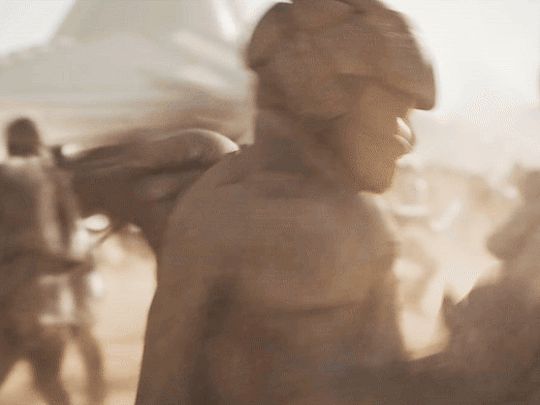
Cinematic parallels
Dune: Part Two (2024)
#dune#dune part 2#dune part two#timothée chalamet#zendaya#zendaya coleman#paul atreides#chani kynes#chani#denis villeneuve#dune movie#gifs#gif#filmgifs#timothee chalamet#tchalametedit#duneedit#parallels#cinemetography#film#movies#film stills
1K notes
·
View notes
Text
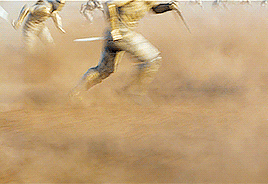

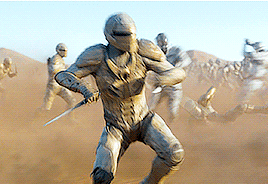
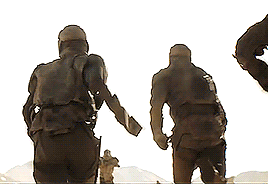
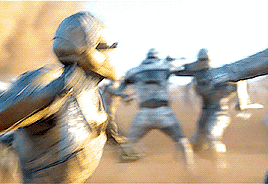
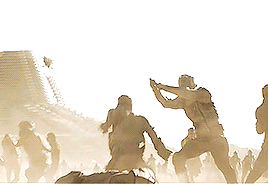




TIMOTHÉE CHALAMET as PAUL ATREIDES in DUNE (2021)
ZENDAYA as CHANI in DUNE: PART TWO (2024)
#dune#dune: part two#dune spoilers#paul atreides#chani#chani kynes#timothee chamalet#zendaya#duneedit#my edit#dune parallels#paul x chani#scifiedit#filmgifs#filmedit#moviegifs#timothée chalamet#usershelby#userelysia#useraurore#userstream#userbbelcher#captspaceface#usersophb#usereme
740 notes
·
View notes
Text
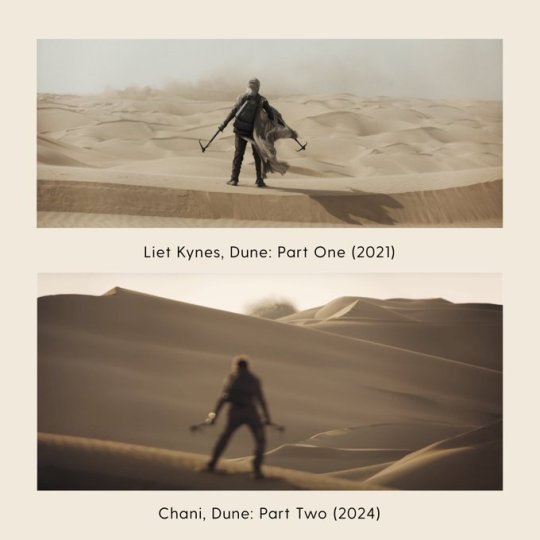
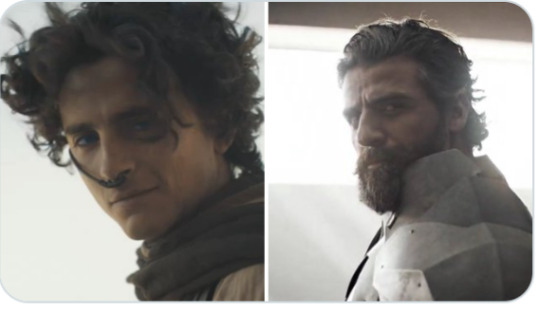
508 notes
·
View notes
Text

this poster is so interesting to me because of where they positioned Feyd. arguably, since Irulan had a prominent role in the movie as a narrator of sorts, she could have been on Paul's other side (and that would also represent the "love triangle" with Chani on one side of Paul and Irulan on the other).
however, it's Feyd who is on Paul's other side, in the shadow of the eclipse. this positions him at a bit of a distance from his uncle and brother, and assigns him a lot of significance as perhaps the dark side of Paul - Paul wants to be like Chani (wants to be a Fremen), but he turns out to be more like Feyd (he is a Harkonnen).
#ofc if irulan wasnt so criminally underutilized she probably would've been at the top next to paul#but oh well#feydpaul parallels hooray#dune part 2#analysis#paul atreides#feyd-rautha harkonnen#irulan corrino#chani kynes#feydpaul#paulchani
66 notes
·
View notes
Text
the string of events that led me to watch dune 2 in theaters is something... and sent me into the rabbit hole that is only possible when you watch something that is 'good' but not 'great' and which doesn't seem interested to grapple with its own themes.
#anyway what i've been writing for dune will remain anon until i finish crossed blades because i don't want a repeat of my last succ fic#i will say tho that what i like about dune is the same thing i like about succ: family as a tool of empire#plus there are some interesting parallels to be made between the rancid misogyny of the empire and the more egalitarian fremen#i love that scene where paul says he'd 'very much want to be equal' to chani and then well... there's the whole ending scene...#chilling depiction of heterosexuality i don't think i've seen such a scathing portrayal of cishet relationships under patriarchy#in such a mainstream movie at least (this is coincidentally the theme i think the movie doesn't grapple well with it's just there#the eugenics of empire are never allowed to become a full source of horror)#the way this reverberates through the genuine tenderness between feyd and paul as they are literally fighting to the death is v moving tho#i have to write something for irulan and chani there's a lot of potential there: the white woman who benefits from empire#(very directly being the emperor's daughter but who is reduced to breeding cattle + war prize by the misogyny of the empire)#and the black woman who is directly victimized by empire but is liberated in her struggle against it
2 notes
·
View notes
Conversation
sb: game of thrones is lord of the rings but with sex.
me: game of thrones is dune but with snow.
#nσt α drαgσn ; вut cєrtαínlч α sαlαmαndєr ( ooc )#íf í cαn lєαrn tσ dσ ít чσu cαn lєαrn tσ dσ ít ( crack )#|| I AM RE-READING DUNE RN#FRESH OFF OF RE-READING GOT#the parallels#the connections#everything#paul and jon?#ned and leto?#ygritte and chani??#the fremen and the freefolk??#melisandre and the bene gesserit??#PAUL AND BRAN HONESTLY?#let it be known#i am not complaining or calling out grrm#bc i love both books equally#but it just made me laugh as i was listening to the audiobook#anyway i need to go to bed but i cant sleep#my stupid self now cant stop making connections between got and dune
11 notes
·
View notes
Note
I really loved Paul and Chani changing places in Paul's visions from part1. Him fighting the Sadourkar, but it's actually Chani that does so; the shot of her holding a bleeding blade, yet it is Paul after he kills Feyd. And in regards to her kissing then stabbing him in that vision, it could be a parallel to Chani's feelings of betrayal—of having given her love only to be stabbed in the back, so to speak (in his proposal to Irulan and turning into the Fremen's "next opressor"). Makes me wonder if we'll have a similar scene in Messiah to the one of her with a burnt face while Paul cradles her, but reversed.
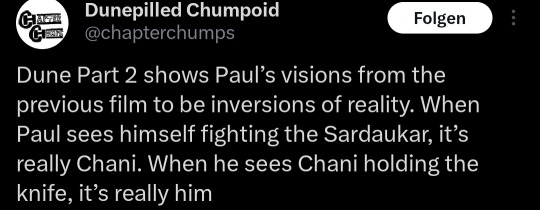
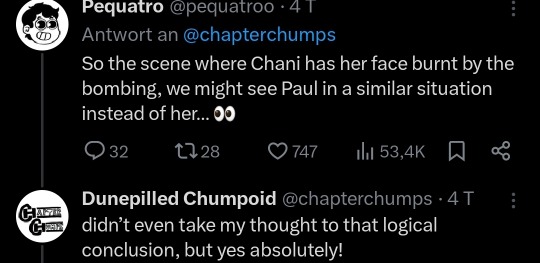
I see u also saw this twitter thread lmao
131 notes
·
View notes
Text
So I am still stuck here: 'She'll come to understand. I've seen it.' Because like how Paul? How is Chani possible going to come to understand after everything that happened in Dune part 2?
Like she is so angry at the end of the film and it really does make me curious as to how Denis is going to bring her to a place where she understands and is ok with Paul's actions in Dune 3. So I have been having a think about it and I have a few theories on what I think could potentially happen with Chani's character and her relationship with Paul in the third film.
To be clear, I haven't read the books, I know a couple of details from dune messiah that were told to me, but I've mostly managed to avoid spoilers, so this isn't based off clues from the book and is very unlikely to be book accurate, but then I figure Chani not being a believer and choosing to leave at the end wasn't book accurate either so it would make sense that how she comes back to Paul wouldn't be either. Also these theories aren't necessarily things I want to happen more directions I think they could go in. Some have similar ideas and themes but with variations, I think how likely they are to happen is going to depend on just how messed up and tragic they want to go with it.
All of them do have one thing in common though, close proximity. I really do think the only way Chani is ever going to understand is for her to physically be around Paul and see him using his new abilities as the kwisatz haderach and then realising that Paul's motivations are still in the best interests of her and the fremen and that he's trying to lead them down the best path to achieve that. They need to rebuild the love and trust between them through having intimate and emotionally vulnerable moments together as well. So these are more theories on how she'll be brought back into close proximity to him more than anything else. But without further ado lets jump into it.
Chani is Pregnant.
So these first couple of theories centre around the idea that Chani may be pregnant with Paul's baby when she leaves at the end. This is a theory that I've already talked about in this post. As a summary, Chani finds out she is pregnant and not wanting to raise the child alone or for her child to not know their father returns to Paul. Or alternatively Paul finds out she is pregnant and uses it to convince her to come back, its possible Jessica may try and manipulate her into returning as well as she'll see Chani's baby as the future of house atriedes.
But I also had another idea playing into this idea of Chani being pregnant and its a little wacky but could be interesting to play with. For me the interesting part of Paul's line isn't the implication that Chani will return but that she will 'come to understand', suggesting she gets on board with Paul's actions, she fully jumps on the bandwagon so to speak. We know that Paul could dream the future and that these dreams were often vague and full of terror. What if Paul's child can also have these prophetic dreams and through some weird bond between her and the baby that allows Chani to start having these dreams. Seeing all these horrors of possible unclear futures she realises the potential cost of choosing the wrong path and in her fear of these dreams combined with the conflicting feelings of being pregnant with Paul's child, she chooses to return to him now believing that he is at least trying to choose the path that will be best for them all. I also think this could create an interesting parallel between Chani and Jessica in that they both had kind of mystical pregnancies. Obviously it wouldn't be exactly the same because Chani's child wouldn't have awareness more just the link between mother and child in pregnancy allows Chani to take on some of the child's abilities as the offspring of the kwisatz haderach.
So I am going to put a dune messiah book spoiler warning here because I am going to mention something from the books that I learned, so if you don't want to be spoiled skip to the next paragraph. But I just want to be clear to those who read the book that when I say I think Chani might be pregnant I don't mean with the twins who I think will be born but later in the film, I mean with their first son who was born in the first book who is killed in the sietch tabr attack. They took it out of dune part two, which makes sense as they changed the timeline drastically, so I think its possible that they'll instead move this plot line into Dune 3 as an explanation as to why Chani comes back. I think their child will die in some attack or assassination attempt and this will make Chani angry enough to want revenge and their joint grief keeps her at his side.
Chani the Manipulator
So two important details make up this theory, one is that Chani's main resistance to the prophecy is that she believes that the fremen should free themselves and not an outsider, the second important detail is that whilst many will think the emperor is the most powerful person in the universe, the bene gesserit gained a lot of power because they had the emperor's ear. It can be argued that the true most powerful being is the one who can influence the one people think is the most powerful. So here's my theory, what if after some time away and after her anger has simmered down a bit she comes to realise that she could have a lot of power in being the one at Paul's side, the one to have his ear. Maybe being unhappy with some choices he is making in the holy war when it comes to her people she has this epiphany of, I can't change what has happened, I can't change the minds of the fundamentalists who are lost to this prophecy, and I can't stop Jessica's or Gurney's schemes/motivations, but I can manipulate/guide Paul. So she pretends to forgive him and goes back, puts herself close to him and sits in on the councils and when discussing decisions etc she nudges him into the direction she wants him to take, essential becoming the fremen that will help free them by working in the shadows. As I said above any reconciliation I think is going to come down to close proximity and I think as Chani is around Paul as she sees that he really can see different futures she is going to be more understanding and more trusting in Paul when he says he is doing necessary evils to ensure the best outcome for Arrakis and the fremen. I won't lie but I would kind of love this one to happen. Not only would I love seeing Chani embrace her own power and still stay true to her goals of putting her people's freedom first, I think it would be an interesting parallel to Paul in Dune part 2 where at first he works to be accepted by the non believers because he wants to use them as a way to get to the emperor but along the way he comes to genuinely love these people and feel like he's one of them leading to him choosing to abandon his previous path of revenge. I could see this going the same way, Chani at first sets out to manipulate Paul for her own motivations but in being around him begins to understand exactly what happened to him when he drunk the waters and what his motivations are now and decides that actually maybe Paul is what's best for her people and maybe her role/place is to be at his side and help him guide them to that green paradise.
Chani the Spy
These next few theories are going to centre around the idea of Chani either being a part of some kind of resistance against Paul or being the leader of a resistance. I could see Chani not being willing to give up the fight that easily and see her finding others who also still don't believe Paul is the Lisan al Gaib and who aren't happy with their people taking part in a holy war. I could see her using this resistance to become a real political pain in the ass for Paul. Maybe even using his own tactics of disrupting spice production against him, or undermining him in other ways. In a theory similar to the one above I could then see her fake forgiving Paul but to spy on him and feed information to the resistance. But again being in close proximity to him makes her feelings more complicated and she becomes less and less sure about what she is doing and whose side she is really on as time goes by and she realises it isn't as black and white as she first thought, I could see maybe the resistance deciding to plot an assassination attempt and this making Chani more conflicted as I don't think she wants Paul to die.
Let's Beauty and the Beast it.
This one again is based on the idea of Chani being part of/ leading the resistance. Maybe the resistance gets into a fight with Paul's forces and it results in this particular faction of the resistance losing and being taken as prisoners of war. Chani is captured amongst them and Gurney upon recognising her takes her to Paul instead of prison. Then we get a kind of beauty and the beast scenario except this ain't no fairy-tale its much darker. Essentially Chani is Paul's prisoner, but he gives her fancy quarters, real close to his obviously, and he makes a few demands like insisting she must eat her meals with him every day, take walks with him etc. You know forced proximity, she agrees to keep her fellow resistance fighters safe, the promise being they won't be harmed if she complies. Again its her being around him, being reminded of how things used to be between them, maybe she also sees glimpses of the Usul she fell in love with during these meals and walks and ends up falling in love with him all over again. That combined with, as said before, her realisation that he can see the future, him convincing her that he is doing it to prevent the fremen suffering a worse fate etc, keeps her at his side.
Green Green Paradise
So this one isn't particularly well thought out more of a vague idea that past through my head, but it was confirmed in an interview that Liet Kynes from Dune part 1 is Chani's mother. This isn't something that they have actually brought up in the films though, yet. But Dr Liet was a ecologist and was all about terraforming Arrakis and bringing water and greenery, which is very similar to the whole prophecy that the Lisan al Gaib will bring a green paradise.
Whilst Chani may not believe in the prophecy I could understand if she still had a dream of Arrakis becoming a green paradise because of her mother's own dream and her mother's background as a ecologist. Paul tells Liet in part 1 that as emperor he could turn Arrakis into a green paradise with a wave of his hand, well he's emperor now, so maybe he'll begin to deliver own this promise and maybe seeing the way he is changing Arrakis so that it has water and greenery makes Chani go back as she wants to be apart of helping build her mother's dream for Arrakis.
Denial
So another option is Denis could throw us a complete curve ball of a plot twist and actually Chani doesn't come back to Paul. Maybe it was only one, or a few possible futures where Chani came back and Paul was just in denial that it wouldn't happen, he thinks that as he can see multiple futures now he can definitely manipulate the events into ensuring she does come back, only he fails and the Dune 3 we get is one where Chani instead is full on resistance leader, fighting against Paul with all she's got. Maybe she even ends up killing him in the end. I have seen this outcome suggested quite a bit and comments like 'I'd love that for her' which whilst I understand the sentiment, no judgements here, personally I wouldn't love that for her. I think as betrayed as she feels, as angry as she is, it is clear that she still deeply loves Paul and I think sadly she always will, that's the true tragedy of their love story, they're on opposite sides/views but still love each other. I think it was clear from her reactions when she thought Paul was dead after drinking the wol and when he was stabbed during the duel with Feyd that Paul dying is her worst nightmare. I can't imagine how heartbreaking it would be for her to be the one to kill him herself, I think it would destroy her, so its not something I would want for her. But I also can't argue that it is a fairly common troupe, the whole love interests where one goes to the dark side, and it ends with one having to kill the other. I'm personally still traumatised from when Buffy was forced to kill Angel in BTVS and don't know if I could take it again.
I Guess We'll Never Know
This is kind of a theory but also more like my worst fear. So another mild spoiler alert for Dune messiah, but the book actually takes place 12 years after the events of Dune part 2. I did put forward a theory that maybe what they'll do for the third film is spend the beginning part showing what happened right after Dune 2, showing the holy war and what happens with Chani etc and then have the time skip a little later in the film and cover the events from the dune messiah book. But my biggest fear is that they will just stick with the time skip and Chani will just be there and we won't really get any explanation as to why she returned to Paul. Maybe they'll just decide that Paul's one line of 'she'll come to understand' is enough of an explanation. I mean I personally would consider this a huge detriment to Chani's character so I am really hoping this doesn't happen, but I'll guess we'll just have to wait and see.
So those are all the theories I have for now. I would love to know what other theories people have but until next time thanks for reading.
#dune#paul x chani#paulchani#chani x paul#paul atreides#chani kynes#dune part 2#dune part 2 spoilers#dune messiah#dune 3#dune 3 theories
74 notes
·
View notes
Text
Changes in Dune Part 2 I liked (not necessarily exhaustive):
Feyd-Rautha being tested in the same way that Paul was tested. A great way to turn them into parallels.
(Implicitly) Irulan getting the title Empress by marrying Paul. It bothers me that in the book she keeps being referred to as Princess. Even if Paul wanted to give her nothing else, at least the title is her right as his wife.
The Great Houses rejecting Paul's ascension. It was strange in the books when they accepted him and then he said "Let's do the Jihad anyways."
Most of all: The rift between Paul and Chani. The movies do go for the theme of resistance against foreign rule more explicitly than the books. The only thing I am wondering is: Are we supposed to just assume Chani is right, or is it at this point an open question?
#dune#dune (movie)#dune part 2#feyd rautha harkonnen#irulan corrino#paul atreides#chani kynes#(is she a kynes in the movies?)#colonialism and anticolonialism#adaptations
76 notes
·
View notes
Text
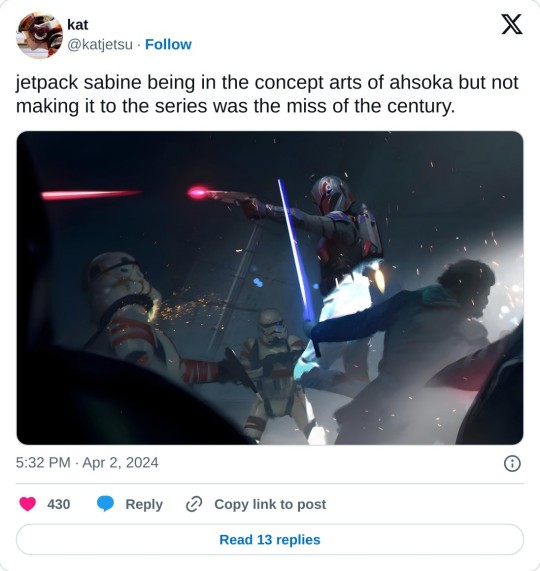
I've got a theory about why this happened, and I think the other Mandoverse shows support it, especially Mando S3. Basically, these shows have over-committed to using the Volume to the point that it hurts their action scenes. Not just in terms of how they look and feel, but what can even be put in front of the camera.
As Greig Fraser (the brilliant DoP who worked on early Mando as well as Rogue One, Dune and The Batman, and first got the Volume to work) has said, the Volume comes with pretty steep limitations. Spielberg has managed to do some things with it that Fraser hadn't thought possible, but for the most part it restricts what angles you can shoot at and also what movement you can have. Film Crit Hulk talks about it in more detail re Mando back in 2020:
Note HOW MANY times they’re standing relatively flat and the camera angle is directly parallel to a ground so that it puts the horizon in the same 1/3 of the frame spot behind them. They do this because if they raise the camera higher (as many shots should and would) it would reveal the “boxy” angle of the stage. It may seem small, but it REALLY de-emphasizes the natural surrounding and I’m worried it’s hurting the overall look of the show.
And it occurs to me that arguably the best-shot action of that series is probably the one where they went out and just filmed in the California hills. Note how Boba gets to tower over that one Stormtrooper and how there's a real sense of wham when he lands.
youtube
If you're shooting everything in a context where nothing can move all that fast, though, it really hurts your most kinetic characters. When Kelleran Beq gets his showcase in Mando S3, the camera can't move to add oomph to his strikes or give him a hero shot (in Kenobi you see them trying this with Vader, but they have to stop short of an angle which will actually give the image punch). If you've seen Dune Part Two, think of how the camera races along with Paul and Chani in some of their fights with the Harkonnens. That's wholly missing here.
And this also impacts the old jet packs (and Jedi acrobatics, for the most part). Whereas Jango could rocket around merrily, it's notable that the Children and the Nite Owls alike only really use their packs for dedicated aerial scenes. In the pirate fight, you can easily imagine them boosting from rooftop to rooftop and sparking even more "high ground" memes, but instead they conduct the fight entirely at a walking pace and on the ground.
And all of this hurts Sabine in particular, because like Ahsoka, she originated in animation and has previously been depicted in a really kinetic way. Even without a jetpack, she's a very acrobatic fighter in Rebels, and it's one of the things which makes her a really fun character. But in the process of moving to live-action, Filoni and co opted to change the characters to fit the Mandoverse style, instead of changing the style to fit the characters. The result is that lots of the things that first made Sabine so cool and fun just aren't really possible now.
60 notes
·
View notes
Text

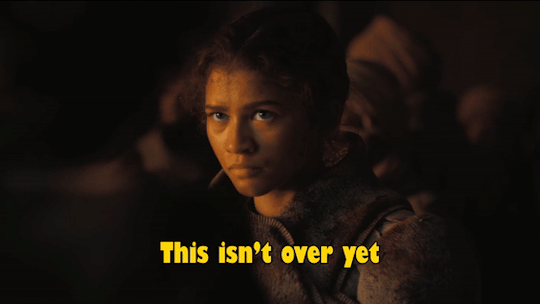
Chani's last lines from Dune (2021) and Dune: Part Two (2024) dir. Denis Villeneuve.
#chani kynes#dune film#dune part one#dune part two#dune parallels#visions vs reality#chani parallels#chani contrasts#chani callbacks#paulchani#paul x chani#chani x paul#zendaya#denis villeneuve#gif making
44 notes
·
View notes
Note
So I'm still super obsessed with your take that Paul's visions are an "inversion" of reality and there's one that my brain is vibrating about in particular. In part 1 there's that one shot of him and Chani (and a couple others I think but it's not clear who they are) on a ship about to land (on Caladan?), with Paul in front and Chani standing behind him.
Now maybe I'm reading too much into this or taking it too literally, but for the most part the visions that are the most obviously "inverted" were the ones concerning the two of them, so I'm wondering what your take on that particular vision might be? Could it be she's actually in front with him behind her? Which seems like an unimportant detail but there could be some deeper layer there perhaps?? idk my brain is buzzing about it and I wanna know if you have Thoughts
Heyyyy. To be fair I'm not the first person to notice the thing about Paul and Chani's positions switching in his visions; I think I first saw that on Twitter. But ooh yes let's talk about that vision.
I'm assuming you mean this series of shots, from the visions Paul has in the tent after the attack on Arrakeen:
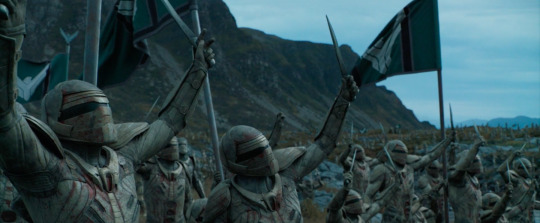
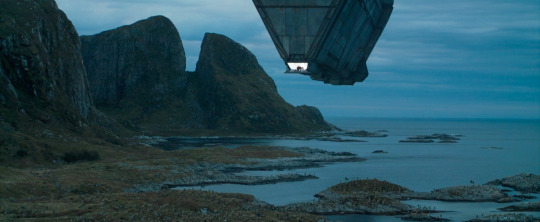
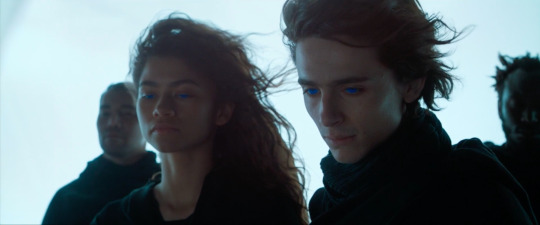
I don't think them switching places is going to be a one-to-one thing that happens every time Paul sees them together in a vision. But there is a lot of interesting stuff to talk about here. Chani wearing black--the color of power and empire--dressed to match Paul, standing at his right hand with no Irulan in sight. Chani gazing haughtily down at Paul's followers in a way it is hard to imagine the real Chani doing. Chani seeming entirely okay with this situation.
This makes me think that this is either a possible future where she has come to accept what Paul is doing, or a future where she is pretending to accept what he is doing for reasons of her own. But, as with all Paul's visions, we don't know if this is the future. (For one, the flags are different than the ones we see at the end of Part Two; they're the traditional Atreides green, white and black instead of the red and tan Desert Power Edition.) We don't know what else Paul sees once he drinks the Water of Life, but this could certainly be a possibility for "She'll come to understand, I've seen it."
While I was watching back through this series of visions I noticed another interesting thing. In Part One, there are multiple shots where we are following Chani walking through the desert, wearing a long white dress with her hair blowing in the wind. But in Part Two, Jessica is the figure in white that Paul is following. (I also think there is at least one shot where the person in white is so backlit/out of focus that we can't tell who it is.) We also have these parallel scenes of Paul in a tent in distress over a vision: Paul seeing the vision of following Chani while Jessica is there trying to comfort him, and later in Part Two, Paul describing the nightmare/vision of following Jessica to Chani as she tries to comfort him.
The metaphor here I think is a bit more obvious--Chani and Jessica represent two opposite paths Paul could take, either embracing the prophecy or rejecting it. But it's interesting to see them connected or superimposed on each other through the visions this way. In the vision in Part One, Jessica even speaks through (or over) Chani; we see Chani say "Paul" in the same urgent way Jessica is saying it in real life.
What does all this mean? Once again, we don't know! Chani is a phantasm at this point in Part One; Paul has not actually met her in real life so it's not clear if the Chani in his visions represents an actual possible future for the real Chani, or if she operates as more of a symbol or a projection of things in his own head. I think the intent is to keep us guessing by having the visions function in different ways--some are the future, some are a version of the future but twisted, and some are metaphors or warnings, and we often don't know in advance which is which. But I'll be super curious to see if some version of this scene comes back in Dune Messiah.
#dune#dune 2021#dune part two#paul atreides#chani kynes#lady jessica#really respect how they managed to make paul look SO SO creepy in this two-second shot#asks answered
38 notes
·
View notes
Text
It probably goes without saying but rewatching Dune 1 makes watching Dune 2 so much more rewarding because you notice all these little parallels between the 2 movies and how these moments are recontextualised after Paul's character journey through the Arrakis deserts. Much have been said about this topic already but I thought I'd list the parallels I found too:
"Father, I've found my way"
In Part 1, Paul shares his worries with Leto that he might not become the heir Leto hopes he would be, to which Leto says that he believes Paul will find his own way when he is called to lead. When Paul says this line in Part 2, he has made the decision to embrace the title of the Lisan Al Gaib. Obviously his late father would never have imagined his son leading a Fremen army against the Emperor as his "way to lead". Ironically though, he has inherited and executed far more successfully the same strategy his father aimed for: form an alliance with the Fremen and harness desert power against the other Houses and the Emperor himself.
"I recognised your footsteps"
Paul says this to Gurney in the training room, the first time they interact onscreen. It shows how familiar they are with each other. Gurney also raises the point that in battle, an enemy may imitate his stride. When Paul says this line in Part 2 they meet each other on the battlefield. Ironically, Paul recognising his footsteps is what saves Gurney from the Fremen's knives. (Also, it's worth pointing out that the first time Paul has a vision in the desert in Part 1, he utters this line too as Gurney comes up behind him. It's a direct parallel to when they meet each other in the deserts in Part 2.)
A frame-by-frame parallel between Paul and Chani on the battlefield
At the 1:38:55 mark, when Paul has his first vision of the Holy War, we are shown a snippet of Paul fighting alongside his army in the battlefield. He flips over several enemies as he decimates them and rises up, taking his helmet/mask off to reveal his blue-within-blue eyes. There's a shot for shot parallel of Chani doing the same thing on the battlefield in their assault on the Harkonnen's Arrakeen fortress in the last act of Part 2.
"The Emperor has no sons. His daughters have yet to marry."
This is less a parallel and more foreshadowing. Actually it's not even foreshadowing, this is the film telegraphing exactly what Paul's plan will be in Part 2: marrying Irulan to make a play for the throne. The fact that he still decides to go through with this plan, a strategy that belongs to imperial court politics and not among the Fremen fedaykin that he's come to represent in Part 2, despite the life he builds with Chani and his total assimilation into Fremen ways and customs, shows just how much his transformation into Muad'dib has and hasn't changed his path towards total dominion over the Known Universe.
"May thy knife chip and shatter."
Both films end on a duel with many parallels between the 2 duels. Part 1 ends with a fight where Jamis challenges Paul & Jessica on their place and acceptance among the Fremen. Paul volunteers as his mother's champion in this duel, just as Feyd-Rautha volunteers as the Emperor's champion in the duel for the throne at the end of the second film. In Part 1, Jamis says the famous Fremen 'battle cry' (so to speak) to Paul. By the end of Part 2, Paul who has fully assimilated into the Fremen's ways says the line to Feyd. Despite all that has changed about Paul though, he still does the Atreides salute (knife raised against his forehead) before the fight with Feyd-Rautha, just as he does in his duel with Jamis.
24 notes
·
View notes
Text
Villeneuve’s Dune Messiah theory
I keep coming back to here…
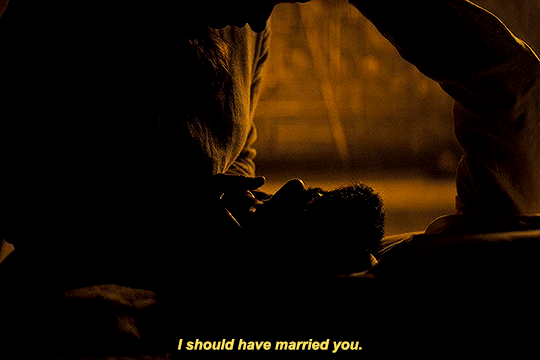
Leto was staring down the barrel of a loaded gun here, and this is him admitting to jessica that one of his biggest life’s regret was not marrying her.
I think this will be paralleled and addressed in Messiah, this time with Paul and Chani.
I think that there is likely no way that DV’s Chani would willingly accept the title of “concubine” despite her love for Paul. Which is why I think Paul will marry Chani, at least, secretly. He’ll do it the Fremen way outside of the eyes and lens of the court. Paul never consummating his marriage with Irulan would theoretically function as a loophole.
Chani is referred to as Paul’s REAL wife (lol) in the books a couple of times, if Paul genuinely marries her it’ll not only function as a testament of his love for her (which is probably the central theme of part 2), but a testament in how little he is influenced by the Bene Gesserit and his court.
33 notes
·
View notes
Text
jonsa, “children of dune,” & women’s disenfranchisement
this is basically a part 2 of this meta i posted last night. if you haven’t read that, i recommend reading it before this one to get the full context! a certain anon (hi!) challenged me to expand upon my thoughts by demonstrating how jonsa might be a response to and/or critique of the ideas presented in the dune series.
i’ll put the rest of the post below the cut for those wanting to avoid dune spoilers!
westerosi historical parallels
i think one of the strongest arguments for linking jonsa (and specifically the bran/sansa/jon trio) to children’s leto ii/ghanima/farad’n resolution is the fact that grrm has sprinkled variations on this relationship throughout westerosi history.
if we look for the pattern of “woman is married to one man but her children are fathered by a different man,” we of course find it several times in the series:
laenor velaryon/rhaenyra targaryen/harwin strong - rhaenyra’s velaryon children were in fact fathered by her lover, harwin strong--apparently because laenor was gay and had no interest in sleeping with his wife. (or going by hotd canon just couldn’t impregnate her for undisclosed reasons).
aegon iv/queen naerys/aemon the dragonknight - while the truth of the accusations against naerys and aemon is dubious at best, the idea that the two of them were secret lovers and that he might have fathered the heir to the throne remains firmly rooted in collective westerosi memory.
robert baratheon/cersei lannister/jaime lannister - this is the most important iteration of this pattern for the main series. we have confirmation from both cersei and jaime that all three of her children are his and not robert’s.
honorable mentions for: the possibility that aegon the conqueror’s two sons might not have been his due to infertility on his part, and the possibility of at least some of aegon ii’s children with helaena actually being aemond’s.
you’ll note that all of these examples echo leto ii/ghanima/farad’n (right down to the prevalence of sibling incest within them) in one or more ways.
you’ll also note that the majority of these led to disputed successions and that all of the children produced by these relationships were involved in succession disputes in one way or another.
the bastardy of rhaenyra’s sons was used as a reason to deny her place in the succession. the alleged bastardy of queen naerys’s son was used as justification for the blackfyre rebellions. and, of course, cersei’s children’s bastardy led to the war of five kings. aegon the conqueror’s son maegor usurped his niece and nephew’s claim to the throne, and aegon ii’s children were caught up in the dance of the dragons.
this leads us to the question, if the arrangement between leto ii, ghanima, and farad’n was shown to be such a useful solution to a succession crisis in children, why do similar relationships show up over and over again in grrm’s series as causes of succession crises?
bastardy and women’s rights
i think what we are seeing is grrm responding to--and likely critiquing--the position of women in dune’s society by focusing on the issue of bastardy.
in the society in which the dune series takes place, a child need not be born of a legal spouse in order to inherit its parent’s position, title, wealth, etc. for example, paul atreides himself is the son of his father’s concubine, jessica. paul’s father, duke leto atreides, never married jessica but kept her instead as a concubine. similarly, paul’s own heirs are the children not of his legal wife princess irulan but of his concubine, chani kynes.
the society’s lack of interest in ensuring heirs are born of recognized legal unions is what allows the arrangement between leto ii, ghanima, and farad’n to be successful. nobody cares that ghanima’s children weren’t fathered by her husband. they’re atreides princes and princesses regardless of their biological parentage, which means that farad’n’s fatherhood (and therefore the children’s corrino ancestry) can be openly acknowledged and leveraged for political benefit.
but that has not been the case in many real societies, and for good reason.
legally disinheriting bastards is a form of protection for the rights and positions of married women in strongly patriarchal societies.
we see within the world of dune itself how men exploit the society’s laissez-faire attitude toward bastardy to disenfranchise women.
duke leto atreides never marries his concubine jessica because keeping the position of his legal wife available gives him political leverage. he can dangle the possibility of a marriage alliance in front of potential allies to draw them in. refusing to marry jessica benefits him politically. and the fact that he can easily name paul as his heir without marrying jessica means that he can use her to give him the heir he wants without offering her the legal rights and privileges that becoming the wife of a duke would afford her.
similarly, paul himself exploits the non-existence of bastardy to disempower his wife princess irulan (and to deny his beloved chani the position of empress consort). he uses irulan’s claim to the throne to gain legitimacy for his rule but by fathering his heirs through chani, he ensures that irulan’s position remains an extremely weak one.
the first book in the series, dune, famously ends with jessica consoling chani by telling her that history will remember them as wives. irulan gets erased despite having the legal title, but while chani is paul’s wife in many real senses, she is denied the legal position and its attendant privileges and protections. both of the women in paul’s life end up in weakened legal and political positions due to his choice of heirs.
in grrm’s series, we see through catelyn’s eyes that the prospect of a husband’s bastards usurping his legal heirs’ position is a very real fear for women in this type of feudal, patriarchal society. in such societies, a woman’s position in the world is determined first by her father, then by her husband, and ultimately by her son. if one of catelyn’s own children succeeds ned, catelyn can be assured of protection, support, and a position in society even after ned’s death. however, if ned’s bastard son, jon snow, inherits, where does that leave cat? she’s no longer the mother of the lord or lady of winterfell, a position that guarantees her a safe future. she has to hope that one of her children, at least, is still in a position to support her--or throw herself on the mercy of another family member. her future becomes incredibly precarious.
we see over and over again in a song of ice and fire that grrm is centering this issue of bastardy, of how it affects questions of succession, yes, but also how it affects the lives of those it touches. we very much get jon’s perspective on how awful it is to shackle a human being with this social position of bastard--but we also get the flipside: how awful it is that women are so disenfranchised that they have no choice but to fear their husbands’ illegitimate children.
furthermore, while these societal structures allow men to exploit women’s bodies to create the children they want, when women try to take control of their own bodies to create the children they want, the society punishes them. we see that in the examples of rhaenyra, naerys, and cersei. in dune, we get a taste of it with jessica, who is derided by her bene gesserit sisters for choosing to give birth to a son instead of the daughter they ordered her to have... except that jessica chose to have a son because it was what leto wanted, and she wanted to make her lover happy. either way, jessica’s body and its reproductive possibilities are not hers to use as she desires. they are meant to be tools for others.
as i have explained, these issues very much exist in both dune and a song of ice and fire, and yet frank herbert seems fairly uninterested in exploring how they affect women and, through them, the wider society. jessica, irulan, and chani’s perspectives are largely sidelined to focus on the men’s stories.
jonsa as a response
in a song of ice and fire, grrm made the crucial world-building choice to have the majority of westerosi society make a legal distinction between the rights of legitimate and illegitimate children. (perhaps someone else has spent some time musing on the somewhat different attitudes of dorne? if so, i’d love to hear your thoughts). if he is writing in response to the ideas presented by herbert in dune, this would be a deliberate choice and a key difference between the societies presented by each.
in the dune series, while leto ii loves his twin sister ghanima deeply (in fact, they both hint that when they are older their love might have a romantic dimension), she ultimately becomes little more than a pawn in his millennia-long plan to save humanity. to put it bluntly, he breeds her with farad’n as a step toward fixing certain genetic traits within the atreides line.
ghanima accepts her part in all of this, but that’s really all she can do. while ghanima may have preferred to have a true marriage with leto (or perhaps some other life entirely), refusing leto’s plan would mean refusing to help him save all of humanity! how could she be so heartless? herbert characterizes her as weaker than leto, both in terms of their prescient abilities but also in terms of moral fiber. ghanima lacks the strength of will to make the sacrifice that leto does and undergo the physical transformation that removes him forever from normal humanity--she must settle for making the “lesser” sacrifice of becoming a pawn in his breeding scheme. (there’s a lot of gender essentialist bullshit happening within dune, as well, but that’s a whole can of worms i don’t have the time to open right now).
in the end, ghanima is no less disenfranchised than her grandmother jessica, her mother chani, or her stepmother irulan. her life and her body belong to leto and his golden path, not to herself. (anyone picking up on the rhaegar/lyanna parallels?)
at the heart of each of the westerosi parallels i mentioned earlier is also a disenfranchised woman. rhaenyra must marry the man her father chooses and somehow give them both heirs even when he doesn’t want to sleep with her. naerys, too, is forced into marriage with her very awful brother aegon when it seems likely she would have been much happier with aemon (helaena seems to be in a similar position with aegon ii and aemond). cersei is married off to robert, who calls her another woman’s name in bed, physically abuses her, and fathers countless bastards while married to her.
but the trio of bran, sansa, and jon will be different.
first of all, the close, loving family relationships among the starks set them apart from virtually every other family we see presented throughout the series. this will be key in making the bran/sansa/jon balance work. precisely because of the relationship they formed with jon while growing up, bran and sansa will know that they can trust him to support their rule without threat of usurpation. similarly, because bran and sansa love and trust each other (heh heh see what i did there) as siblings, they can share power without the need for a marriage alliance.
unlike leto, bran will have no need to marry sansa in order to control her and her claim. this removes the need for sansa to marry one man while having children with another. and unlike farad’n and ghanima, jon will be someone that sansa has already formed a bond of love and trust with at the point that they marry--and someone that she wants to marry.
this is why the romance between jon and sansa will be a key factor in differentiating their relationship from the previous patterns. their love for each other will allow them to break the mold because their marriage will give them what they both dream of having rather than denying them what they’ve always wanted.
unlike the women in the previous examples in westerosi history (and unlike ghanima), sansa’s marriage will empower her. sansa will be queen in her own right, not consort. she will be her brother’s equal in position and power, not his pawn and certainly not his baby-making machine. sansa will be able to have children with both her husband and the man she loves, because they will be the same person. and, crucially, sansa will be able to have the children she has dreamed of having: stark children, to replace the family she lost and fill winterfell again with the love and laughter she remembers from her childhood.
there is also the element of this arrangement resolving catelyn’s fears, though catelyn herself (even as stoneheart) will likely never experience this resolution. jon yields his potential claim not once, but twice, to catelyn’s children. and yet, jon still gets winterfell, gets to be a stark, and his children will have a legitimate claim to the home he loves.
king bran/queen sansa/consort jon might very well be grrm’s answer to the issues inherent in herbert’s trio of leto ii/ghanima/farad’n. it would almost certainly be an answer to the parallels grrm himself has placed into westerosi history of rhaenyra, naerys, cersei, and others.
this is why i think that jonsa will be part of grrm’s end game: because it works not only politically but also romantically...and corrects the wrongs we have witnessed over and over again in previous relationships within the series.
#jonsa#jonsa meta#i know the ideas i'm presenting here have been evaluated by other jonsa metas previously#but hopefully the comparisons with dune offer a unique perspective!
77 notes
·
View notes